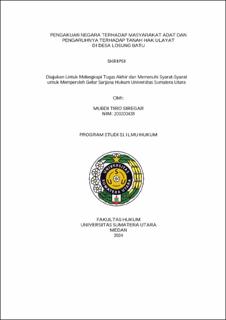| dc.description.abstract | The recognition of indigenous peoples by the state in Indonesia provides a legal basis for the existence of ulayat rights; however, its implementation often leads to conflicts, particularly concerning land ownership and natural resources. Therefore, an evaluation and adjustment of policies that better respect the rights of indigenous peoples are needed, especially in the management of ulayat land in Padang Sidimpuan. This thesis is titled "State Recognition of Indigenous Peoples and Its Impact on Ulayat Land in Losung Batu." The research questions addressed in this thesis are: how is the protection of indigenous people's rights in Indonesia, how does national law relate to customary law regarding the rights of indigenous peoples to ulayat land, and how does the state's recognition of indigenous peoples affect ulayat land in Losung Batu Village.
The method used in this thesis is the normative-empirical legal research method. The normative legal research is based on secondary data, which includes primary legal materials, secondary legal materials, and tertiary legal materials. The empirical research involves data directly obtained from the community as the primary source through field research conducted via interviews.
The findings of this legal research indicate that the legal protection of indigenous peoples in accordance with their constitutional rights is a state responsibility, as regulated in various national legal instruments, including the 1945 Constitution (UUD 1945). The relationship between national law and customary law regarding the rights of indigenous peoples to ulayat land reflects a complex interaction between the state's formal recognition of traditional rights and the active use of customary law by indigenous communities in their daily lives. The state's recognition of indigenous peoples influences ulayat land in Losung Batu Village by providing significant legal legitimacy to the indigenous community in maintaining, managing, and protecting their ulayat land. This recognition, as stipulated in Article 18B paragraph (2) of the 1945 Constitution and reinforced by various laws, gives the indigenous community of Losung Batu a strong legal basis when facing claims or disputes related to their ulayat land. However, challenges remain, particularly concerning formal recognition through land certification officially recognized by the government. | en_US |


